The Celwyn Newsletter Issue 17
In this issue, interviews with:
Karen Haden, author of historical crime thrillers
Kurt Springs, sci-fi novelist
Aaron Ryan, sci-fi thriller novelist
The second installment of the serialized short story, The Frequency of Violets, appears and the first installment of Genevieve Understood Us, by Richard Koreto can be found on his website.
Celwyn’s Cats

| Thank God I’m done editing! |
An Interview with Karen Haden
Why did Crackleton’s wife travel to Lincoln and die there? Apprentice Baxby vows to help his friend discover the truth. His loyalties will be tested, amidst Tudor court politics and espionage, but murder must out.
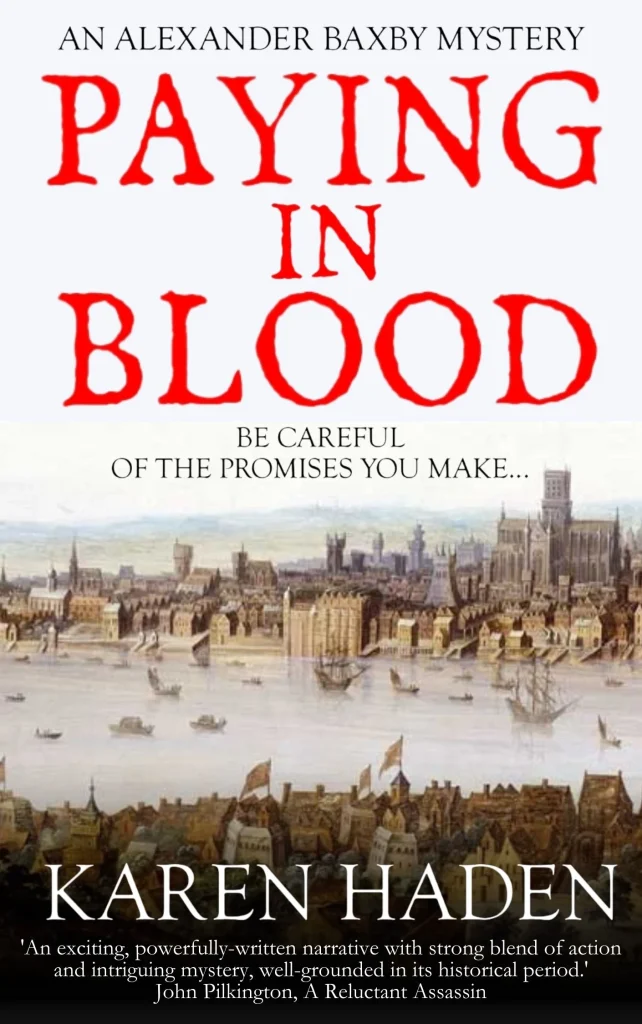
Karen Haden was born and raised in Portsmouth, but now lives in the South West of England with her husband and family. She graduated in engineering, then worked as a consultant for government clients, alongside volunteering as a prison chaplain. Using these experiences, Karen writes historical crime thrillers encompassing politics, espionage and spirituality, from the perspective of ordinary people.
Her debut novel Paying in Blood was published by Sharpe Books in March 2024.
How would you compare Paying in Blood to other styles of mysteries?
Set in England, during the last years of Queen Elizabeth I’s reign, Alexander Baxby’s quest to solve the mystery of a young woman’s suspicious death leads him into the murky world of Tudor politics and court rivalry.
More unusually, the novel shows their impact on ordinary people’s lives, as powerful statesmen and bishops exert increasing control through espionage, surveillance and limiting access to books. Baxby tells his story from gaol, so the precarious nature of early 17th century life is never far-away.
Of all your characters, which is the most like your personality?
Baxby shares character traits and life events with my late father and myself. Like many working in Defense and Security, we understood the need to keep secrets, even from closest family and friends, and the resulting tensions that can bring. I am glad to have retired from that environment to write.
Who is your favorite villain of all time and why?
Disney villains such as Cruella de Ville and Snow White’s wicked Queen remain strong favorites. Growing up, I was closer to my father than mother in a competitive home, which may explain my on-going fascination with the complexities of female malevolence and power.
Can a villain be sympathetic, or do good deeds to be redeemed?
In my childhood and whilst working as a consultant, I saw how minor differences can spiral into major conflict. Issues were rarely black and white. People with different perspectives often saw different parts of the whole.
As a result, my heroes and villains are more nuanced. Although courageous, loveable and loyal, Baxby has multiple weaknesses. Antagonist Archbishop Bancroft does what he deems necessary to protect national security, with lethal consequences.
Will there be a sequel to Paying in Blood, and if so, what will it focus on?
The next Alexander Baxby mystery will be published in the autumn of 2024, in which his attempts to start a new life in Amsterdam will be shaken by a series of unexplained deaths. Suspecting Bancroft’s spy-network has spread beyond England’s coast, Baxby’s own life will be threatened as he pursues the truth.
Connect with Karen Haden: https://karenhaden.blogspot.com
An Interview with Kurt Springs
Deirdre and her sisters’ homecoming plans are disrupted when their parents are kidnapped. In their desperate search, they discover the Rebellion is building weapons that could end galactic civilization.
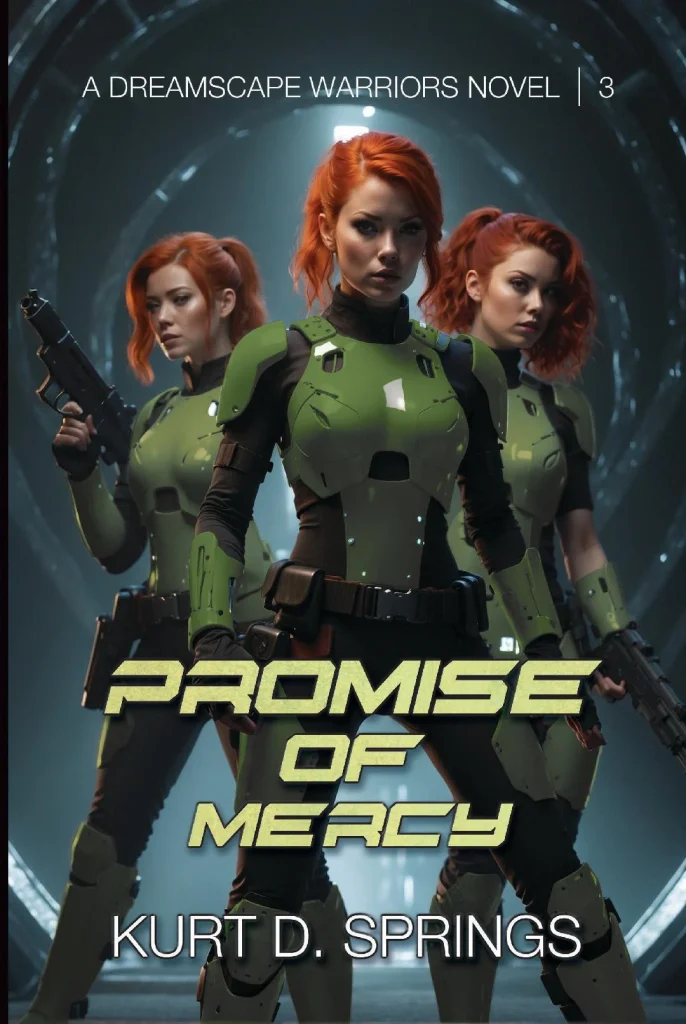
Kurt D. Springs is presently an adjunct professor teaching anthropology and archaeology in New Hampshire. He holds a PhD. in anthropology from the State University of New York at Buffalo, a Master of Literature in archaeology from the National University of Ireland, Galway, and a Master of Liberal Arts in anthropology and archaeology from the Harvard University Extension School. His main area of interest is megalithic landscapes in prehistoric Ireland.
What one aspect of sci fi makes it richer than the other? what are the drawbacks when writing one or the other?
There are many types of science fiction. Hard science fiction tries to stay true to the known rules of “how the universe works,” such as Einstein’s speed of light limit. Space Opera tends to hand-waive many rules for the sake of the story being told. To get from point A to point B in the galaxy, Gene Rodenberry’s Star Trek used “warp drive,” and George Lucas’s Star Wars used “hyperspace.” In Robert Silverberg’s stories, people traveled between galaxies using something he called “overdrive.” I use “interdimensional,” which is similar to warp drive. It allows me to tell a story that takes place within a reasonable length of time and explore other aspects of my universe. The drawback is that science purists can claim it is more like “science fantasy” because “you can’t travel faster than the speed of light without time dilation.” At least I’m in good company with Rodenberry, Lucas, and Silverberg.
In your upcoming book, did you change the personality of one of your characters to make them more interesting, less violent, more empathetic, etc. than the books preceding it?
In the last scene of Promise of Mercy, as Deirdre and her family step onto the tarmac of Etrusci, their home planet, her father says. “Did it really change that much since we left? Or are we the ones who have changed?” Promise of Mercy focuses on Deirdre and her identical triplet sisters, Aisling and Bayvin. The triplets are highly skilled but have only just finished advanced training. Their father, Liam, was the hero of Price of Vengeance and Legacy of Valor. Experience has changed Liam from a green junior officer to a seasoned veteran. Raising three girls and a boy also made him an experienced parent, which helped when he was befriended by Marisa, a retired Rebel leader whose little girl needed his help. This is more of a natural progression of his maturing as a person.
Deirdre experiences growth that almost mirrors that of her father. At the beginning of the story, she decides she should kill Marisa. By the end, she starts to have doubts. Hence the importance of the title. Marisa has a colorful career as a Rebel commander and scientist. We see her in Price of Vengeance after gathering Liam’s genetic material for her own project. By the vents of Promise of Mercy, she has become disillusioned by the Rebellion and regrets much of what she did during it.
Which of your books was the hardest to write, and why?
Legacy of Valor was the hardest to write of the books published to date. It involves a full-on battle on the moon of Treespo, which orbits the planet Beta Proximus IV. Liam was forced to take control of the division. Keeping the various parts of a multipart battle straight and interesting is not as easy as it sounds.
Will there be a sequel ?
I have three novels that are entering the editing stage before being sent to the publisher. Addiction of Power focuses on Liam’s son Aidan as he and Marisa’s daughter try to bring an end to the civil war. It is something of a romance between the two. Following that is Path of Redemption, where a minor villain from Promise of Mercy falls for Deirdre. I also have a prequel novel taking place 600 years before the events of Price of Vengeance.
Editing! By Joe Mistretta
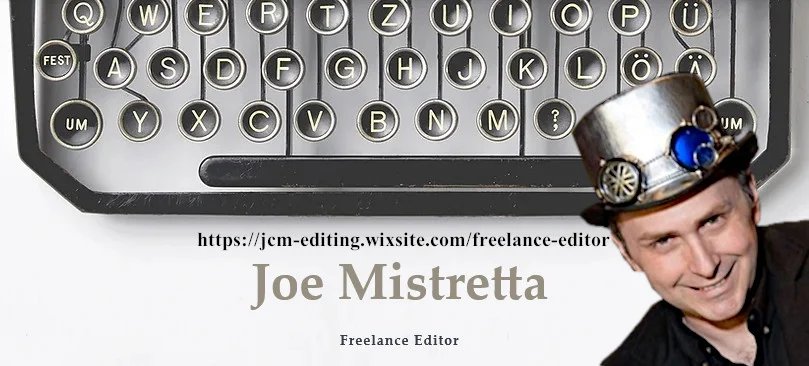
Let’s talk about passive voice.
(Was and Were are the most commonly used culprits)
Yes, certain writing styles call for some passive voice. I stress the word “some.” While a well-placed passive voice sentence can add to the stylistic allure of SteamPunk, or the period pieces of literary fiction, most of the time, (even within those examples) passive voice runs the risk of disengaging the reader from the flow of the scene.
When writing, it is all about showing and not telling.
We show the reader what is happening, we don’t tell them. This may sound strange as our job is to write words, so let me give you an example:
Passive voice.
1. There is a cast iron tea kettle on the stove, whistling. I knew the green tea had been steeping for a while because it had been whistling for five minutes.
Active voice.
2. A cast iron tea kettle whistles on the stove. Its high-pitched alarm rang through the kitchen for five straight minutes.
Forget the fact the sentences are basic. The first tells the reader what instead of showing—there’s a tea kettle whistling for five minutes.
Passive voice has a much harder time painting a picture.
Active voice brings the scene to life.
There are many ways to write passive and just as many to turn those phrases into active. Of course, passive voice cannot always be avoided. And, as stated, the occasional use is fine. But avoiding them makes for more engaging writing, and I think we all strive for that.
Here’s a way to practice with your writing. (I’m not selling anything) Get a free account with Pro Writing Aid or Grammarly. Make sure the passive voice alert is turned on. Go through your work and find a purple underlined sentence. Think of different ways you can restate the sentence in active voice. Sometimes a simple word substitution or two is all you’ll need. Other times, an overhaul will be needed. Practice and have fun with it.
We all write because we have stories inside us we feel we must tell. I’m here to help you tell them in the best voice you have.
Happy writing!
Joe Mistretta, [email protected]
website at jcm-editing.wixsite.com/freelance-editor
Books On Your Terms: The Perks of Digital Reading and Audiobooks by Gina Mitchell
Digital reading and audiobooks have transformed the way we enjoy books, offering new levels of accessibility and convenience.
Digital reading is a game-changer for anyone who loves books but needs a more flexible approach. You can tweak the font size, change the background color, or even switch to a voice reading the text to you. This is especially helpful for people with visual impairments or reading difficulties. Plus, with e-books, your entire library fits in your pocket, making it easy to dive into a new story whether you’re on the bus, at the airport, or just lounging at home. And the best part? You can download a new book in seconds, opening up a world of stories at your fingertips.
Audiobooks are perfect for those moments when you want to read but need your hands and eyes free. Whether you’re driving to work, hitting the gym, or preparing dinner, you can immerse yourself in a story or learn something new without pausing your day. A good narrator can make a book come alive, adding layers of emotion and personality that make the experience even richer.
Together, digital reading and audiobooks make it easier to enjoy books wherever you are, fitting seamlessly into the flow of everyday life.
Upcoming on Gina’s blog:
Weekly Friday Finds https://ginaraemitchell.com/category/newsletters/ featuring Indie Authors, Book Recommendations, Recipes, Crafts, and Contests and Monthly Indie Author of the Month
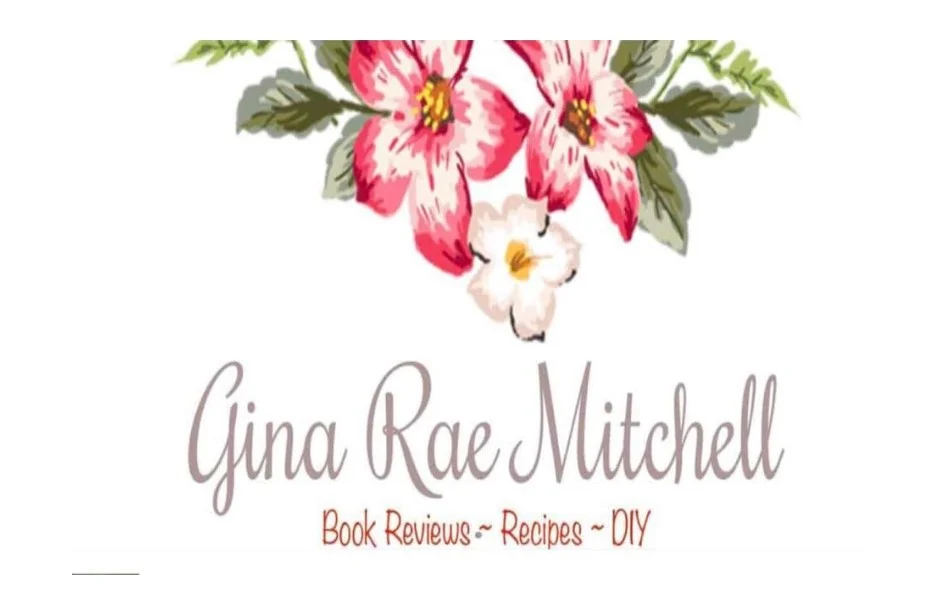
Interview with Aaron Ryan

Aaron Ryan is the author of the bestselling “Dissonance” sci-fi alien invasion saga, the sci-fi thriller “Forecast”, the business reference books “How to Successfully Self-Publish & Promote Your Self-Published Book” and “The Superhero Anomaly”, several business books on voiceovers penned under his former stage name (Joshua Alexander), as well as a previous fictional novel, “The Omega Room.” Aaron has always had a passion for storytelling.
I currently admin a 32k member author group on Facebook that I, hmm, “inherited.” Author Evie Ryland administrated it for years but found that it had grown beyond her ability or desire to maintain, so she invited other admins to take over, and I stepped up. It’s a great group. The online groups are RIFE with scammers and swindlers promising marketing abilities, demo videos, reading jobs, etc., and we’ve really cleaned house in my group. I’m very grateful for the interactions that happen in there, although I always wish there were more.
How soon do you know you’ll kill off a particular character, and what told you to do it?
I’m more of a “pantser” in how I write, which, for those who are unfamiliar with the term, I’m more of an organic writer. I prefer to let the character take me where they want to lead me. That doesn’t mean that my writing is to the exclusion of mileposts, mile markers or guidelines off any kind…no: doing so would be sculpting a novel bereft of forward direction. Art mirrors life, and life just ‘happens’ to us. So I like to write in that style, and let events unfold that take me by surprise as well. That includes the death of a character, which I don’t really know about or plan until I’m pretty much right upon the death itself. That being said, there are times where I know I have to advance the mission of the protagonist, and sometimes there’s no greater catalyst than someone dying in order to set them on a path of resuming that mission with greater intent.
Which of your books was the hardest to write, and why?
Dissonance Volume III: Renegade was the hardest in terms of the series. It involved FAR more research than I’d ever conducted on a book before. There are a lot of military elements to it, and those military elements and details need to be authentic and correct. I conducted a ton of research with colleagues and friends who are or were in the military in positions of knowledge, and they were immeasurably helpful. I really strove for verisimilitude in my books, especially in Volume III. The last thing I would want is for a seasoned military vet to read that book and exclaim, “What?!?! That’s not even right. This author is out of his mind.” I’m very proud of how it turned out and the incredible direction I was given by my military friends.
Talk about how your series came about. What did you initially visualize for the theme? Did it lead to an idea for a new series?
I honestly just had plans to write a single book focusing on an alien invasion. I had no idea there would be so much of a robust subplot that demanded further exposition and investigation. There are a lot of great character arcs in here, tons of beautiful world building, wonderful stories and great backstories I needed to mine. So it ballooned into two, and then three installments, and then, my favorite: the prequel. The prequel has a TON of heart in it. I love all of them and am proud of all of them but that is, by far, my favorite. And now I’m working on another installment in the series! I have been trying to work on a brand new novel that is NOT “Dissonance”-related, but this universe keeps sucking me right back in! 😊
Connect with Aaron: www.dissonancetheseries.com
The Celwyn Series YouTube channel
The Celwyn’s YouTube channel
Upcoming Release
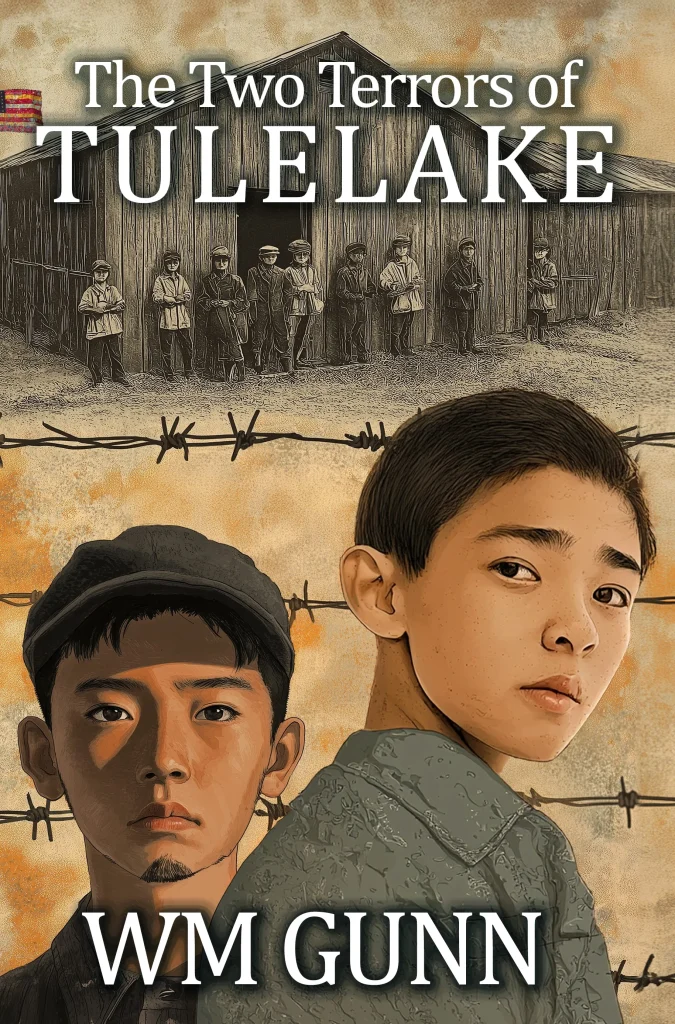
WM Gunn’s new novel will be available October 2024
THE TWO TERRORS OF TULELAKE
The horrors of World War II shocked the world. Americans believed it could never happen here…until it did.
Ichiro Hisakawa and his family were part of the American culture – living the American Dream – until February 19, 1942, when President Roosevelt signed Executive Order 9066 that branded them “the others”. Taken from their homes and stripped of their lives and citizenship due to their ancestry, they endured deplorable conditions in the “relocation camps”. Typhus ran rampant through the camp, and riots were a daily occurrence. And for the first time, America was scornful. Life was difficult and the Hisakawa family did their best to endure it all.
However, 16-year-old Ichiro wasn’t prepared for the betrayal, murder, and escape that was waiting for him. And how did Bobby King, a sixteen-year-old from 2017, find himself in 1942 and befriend Ichiro?
What is New with the Celwyn Series?
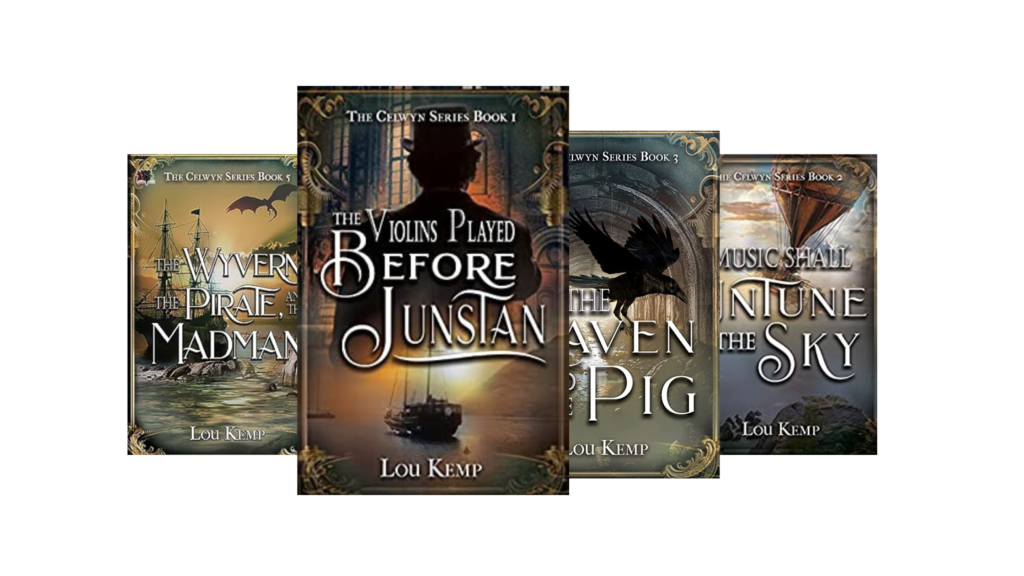
What is new with the Celwyn Series?
A draft of the blurb of the upcoming Swango, book 6:
“The story opens in 1877 as Celwyn and his brother survive a vicious attack in Singapore. The atmosphere aboard the Nautilus is tense; not only has Pelaez returned (claiming his innocence for destroying the flying machine), but a third of Nemo’s crew is marooned in the city and under threat by Wolfgang, Celwyn’s father.
By the time the magician and the others leave Singapore, they are grieving; a member of their family has been murdered in Prague.
The magician’s first encounter with Swango is told as they plan for the Nautilus’ journey to the Castell de Ferro in Spain where Doctor Jurik Lazlo is hiding. Captain Nemo has been searching for him for a long time.”
Book 6 is through editing with my publisher, and the cover will be ready soon. Swango, will be available at the end of December. Warning: it contains a new genre. One that fits totally, and gives the ongoing story more freedom.
For book 7, Lucky and Mrs. Nemo: Finally, I’m almost done editing. By the time you read this newsletter, it will be complete and off to the beta readers. Either I’m getting pickier when I edit, or my writing is deteriorating. Whatever the cause, book 7 will be in good shape and my blood and sweat used for ink. I don’t cry over editing, I just get more tea.
There isn’t an official blurb yet for Lucky and Mrs. Nemo, but Lucky is a character, literally and figuratively. Traditionally the personality of a scientist is dry. Not so for Lucky, who enjoys a good gunfight. She participates in the final bloody scene as they defend Findbar, and where they find the ghost of Mrs. Spencer in the mansion’s tower with her broadsword and a deadly attitude. The new genre introduced into the series in book 6 is active in book 7, and Kang and Bartholomew both wish it weren’t. Certain things scare them more than others.
Book 8: 130 pages of the handwritten first draft is still safely put away until the book 7 edits have been finished and it has been beta read. This cuts down on confusing my brain. As a preview though, book 8 addresses the dangling danger at the end of book 7 most satisfactorily for those of us more bloodthirsty than others. Then things get worse.
The near future will have Pelaez still causing trouble, and Celwyn keeping the peace between his brother and Captain Nemo. Maybe Swango can be bribed to leave Pelaez somewhere in the future?
Shameless Buy Links to booksellers who carry the Celwyn series.
The Violins Played before Junstan book 1
https://books2read.com/celwyn01
Music Shall Untune the Sky book 2
https://books2read.com/celwyn02
The Raven and the Pig book 3
https://books2read.com/celwyn03
The Pirate Danced and the Automat Died Book 4
https://books2read.com/celwyn04
The Sea of the Vanities. Companion book
https://books2read.com/celwyncompanion01
The Wyvern, the Pirate, and the Madman Book 5
https://books2read.com/celwyn005